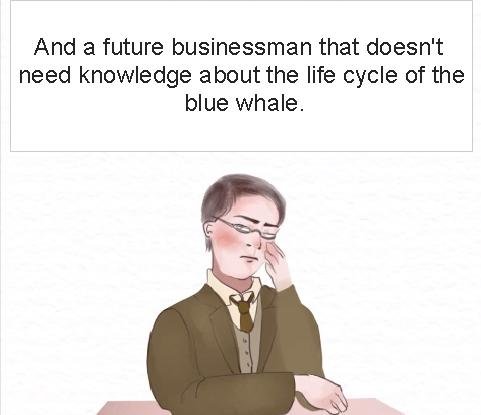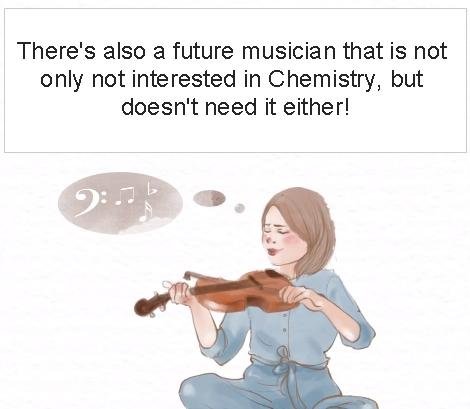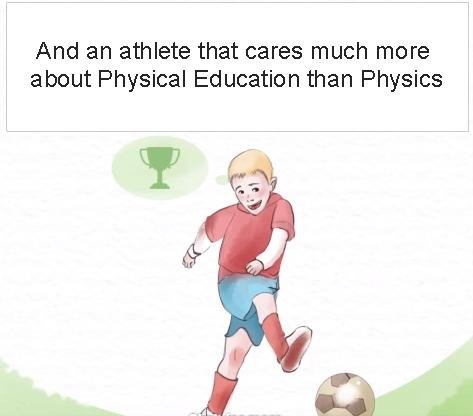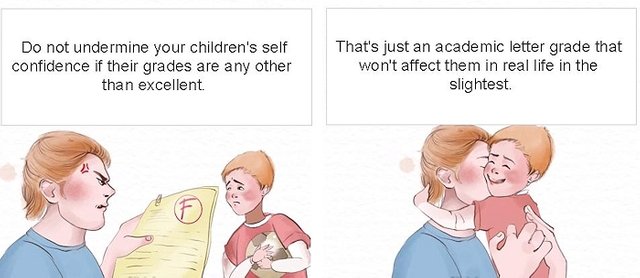Do we really need to learn all that in school?

Is academic success important for later in life? Recently, I came across a little video that aimed to highlight why parents should not put too much pressure into their children’s academic achievements. I think there was a worthy message coming across: Firstly, do not pressure your children to high academic achievement at the price of their self-esteem; also, be open to the possibility that they might have a vocation that doesn’t require them to stick to an academic path.
However, I found quite a few statements conflicting and worth discussing. The following are stills I got from said video, the original I saw is in Spanish so I translated the text).
Do we need to learn all that?

True to an extent. It is highly doubtful that he will ever need to use integral and differential calculus; however, geometry, statistics and arithmetic are fundamentals that are useful in everyday life.



Wait a second. Just like in the case of the painter who doesn’t need mathematics, this is only true when talking about more advanced stuff. Sure, a musician or an athlete will have no use their career for understanding and applying the Michaelis-Menten equation or the nuances of quantum gravity and string theory.
However, a solid knowledge of the fundamentals of physics, chemistry and biology is needed. Failure to understand the basic principles about how the world around us and our own bodies work is how we end up with people who believe the Earth is flat, vaccines are evil and that you can cure cancer by drinking juice every morning.
Things like the main elements and molecules that conform the natural world and ourselves, the main physiological processes in our bodies, basic genetics, the pH scale and how it works, concepts like mass, acceleration, force, resistance, basic chemical reactions and how sound and optics work, for example, are concepts we should all be familiar with. In this case, knowledge is power and having a firm grasp of this could help us make better decisions that could impact our wellbeing and health, as well as discriminating between bogus information and accurate facts.
The same is true about history and politics: we need to learn some background knowledge so we get to understand why our society is the way it is, why certain systems do not work, how masses react to certain measures. There has been a lot of experimentation with tangible results that could help us understand our current situation and predict what might happen if we drift towards a similar status, why waste it instead of using it to make better decisions?
How much importance should we give to grades and academic achievement?

The thing is, as a school-aged kid, learning and performing well in school is most of the times your only responsibility. Sure, there are kids that engage at a deeper level in extracurricular activities since an early age (playing an instrument, sports or martial arts, an artistic pursuit or family craft, for example), but I would venture to say they are a minority.
Most kids don’t spend their after-school hours acquiring and practicing a skill, but just playing or relaxing, typically watching too much TV and playing too many hours of videogames – and I should know, both my brother and I were like this.
Dealing with school work prepares you for adulthood, where you will also have to juggle multiple tasks and deal with tedious procedures – even if you end up having your dream job, you will still have to deal with stuff like taxes, bureaucracy, finances, insurance, contracts, etc.
It is very true that performing poorly in school does not necessarily mean that the child in question is intellectually subpar or incapable; some people just feel bored, are not provided with the right material for learning, or lack an inspiring and motivating environment that lets them understand why what is being thought to them is important – we all have been victims of crappy teachers who made their lessons confusing and unbearable.
Kids should not be put under pressure to obtain excellent grades all the time at the expense of their mental health, and should be made to understand that a low grade doesn’t mean they failed, only that they need to work on improving their weak points for the next time. No one is going to deny you a job because you got some D’s in middle school and occasionally flunked your Maths tests.
However, one could argue that grades are a reflection of certain personal qualities: responsibility, discipline, organizational skills, focus, perseverance, even resilience. These are all necessary qualities for achieving any degree of success in life.
Many people like to argue that there are plenty of examples of people who dropped out of high school or college and achieved great success (from Bill Gates and Steve Jobs to Jim Carrey and Connor McGregor), however, they seem to miss the point that one thing these people have in common is that they had the exact same qualities necessary for academic achievement, only they focused them somewhere else with such a laser focus and unrelenting perseverance that they achieved the extraordinary. Furthermore, there’s the survivor bias: we get to hear from these cases because they are inspiring and spectacular, but we don’t hear about the countless other dropouts who failed to achieve their dreams or just had to settle with a very modest and perhaps not very satisfying way of life.
Learning as a chore vs learning for enjoyment.
Another thing that I don’t like about the statements in the video is that they seem to push the idea that learning is something that should be done strictly out of necessity and practicality. Love of knowledge or curiosity don’t seem to be taken into account at all, even though it is a basic component for human development and self-improvement.
The view of study and learning as a chore that should not be done unless necessary is a very damaging and limiting one. Do I need to know about cryptozoology, the history of Brazilian Jiu-Jitsu or the mystical experiences of holy men in the medieval era? Does @trumpman need to know about all those weird plants and animals in order to be successful in life? Of course not. We do it because we, as human beings, are curious and enjoy learning new things.
My grandfather says that knowledge is never unnecessary, and since it doesn’t occupy any space, you can always carry it with you. Why limit ourselves to the quotidian and practical, then? Even more so, one never knows when something that at the time seems completely superfluous to know can become relevant later (like explained in the famous "Connecting the dots" speech from Steve Jobs at Standford University).

What do you think? Do you believe that what we are currently taught in school is all necessary? Should some people be exempt from having to learn certain things?
Do you believe that academic success is important, or not at all, to be successful in life?
Feel free to share your opinion or experience in the comment section!
Irime
I loved this post too! I'll represent the other side of the argument to @branlee87... I've always been great academically (well since year 10), I scored in the top 4% of the state graduating from high school. Got an academic scholarship to study in the USA (I'm from Aus) and then got into medical school on my first try.
Through this time probably 95% of what I've learned will never be used if I become a doctor... but I needed to know that 95% in order to build on it and understand what I will use. For example, I'll never need to know organic chemistry in order to treat a patient, but I did need to know it in order to understand the molecular basis of the pathophysiology that underlines their condition.
I think the real key here is passion... if you're not interested in learning there's no point forcing it! So much research has been done into how we should be educating children in open environments that promote questioning and exploration, but none of it's ever put into practice!
It's such a shame because now we've got such a scientifically illiterate population with such low ability to think critically that we're seeing a resurgence in things like anti-vaccine advocates and anti-GMO fear mongerors, based solely on ignorance.
I think you make a great point about how it is not necessary to learn everything, but in a sense it is necessary to know about everything:
While doing my Master's, there was this professor that was infamous for expecting that his students memorized such things as the exact chemical structure for all amino acids. Luckily for me, he retired and I got the more reasonable professor who cared more about us learning about the properties of the amino acids and their functions within the body, since he reasoned that we could always check the structure in a book whenever needed. In a similar fashion, another professor who taught us cell cycle regulation told us that he didn't care that we knew by heart the names of each molecule involved in every step, but that it was important that we knew how the regulation occurred and which events triggered what action (he even said, "if you can't recall the protein's name, just write something like protein x in the test").
This strategy works because it takes off the pressure when learning and helps people focus in the important principles rather than overwhelming their brains with details that most likely will start to fade as soon as the test is over. To be a good researcher or doctor, you don't need to know everything by heart, but you certainly need to know what to look for and where to find the information you need.
Cheers, and thanks for this very thoughtful comment, @tfcoates!
I couldn't agree with this more! The importance is in understanding, not in memorizing, and ultimately it is this understanding which allows us to go forward and build upon our knowledge. No one ever failed to understand DNA because they couldn't memorize the structure of guanine.
I think our education system should foster one thing above all in kids: curiosity.
When curious, kids like to learn, and will learn much easier.
Too much pressure and grading can kill the natural curiosity, and then things get nasty for the kids, but also for teachers and parents. But no pressure at all will sometimes lead to kids not learning the basics at all too.
So the ideal system would probably keep an individual balance of not pressuring kids as long as they strive to learn naturally, but having "red lines" of basics that every child needs to learn with consequences for failure.
Yes! Fostering curiosity is definitely key for more effective learning. If you do it well, and get kids to wonder about something, not only will their learning become more effortless, but they will even do research on their own sometimes!
That's pretty much what happened to me, my parents and grandfather always made Science look like something entertaining, fascinating, accessible and fun. Learning stuff didn't feel like a chore. I even made a post about it a while ago:
https://steemit.com/science/@irime/the-story-of-a-curious-child-that-became-a-scientist-how-i-got-into-science
However not every individual is interested in the same subjects, so the idea of setting a minimal baseline for basics that everyone must know is definitely wise to ensure that there is not so much lagging behind in those areas that are not so attractive to them.
Thanks for commenting, @sco!
Really interesting post. Loved how you presented both sides of the arguement.
Coming from someone who was terrible(and probably still is) at school and academics, I'm obviously going to side with the opinion of not putting too much pressure on your child when it comes to school. But at the same time, it's difficult to cater to every child considering the fact that we're all different and probably learn things at very different rates if we are capable of learning them at all. I feel that it always came down to actually being interested or passionate about something. For as much as I forced myself to study back in the day, the concepts of maths and physics would just not go in. But hey, maybe I'm in the minority here :P
Either way, really enjoyed your post :) And I agree that people like Conor McGregor definitely fall in the 5%.
Oh, definitely. Looking back, the subjects where I always did well in school were those that I liked the best (literature, biology, philosophy, psychology, genetics, etc.), and I'm sure many people had a similar experience, so passion is a key element for succeeding at something.
Fun fact: even though I was always a nerdy nerd and a Straight‑A student, once I reached high school I started failing Maths and Physics right and left. Like you said, it was like the concepts would just not go in. I had to get private lessons in order to barely pass my tests so my final grades look quite funny, a collection of C's and D's in Maths and Physics with A's in everything else...
Thanks for commenting and sharing your experience, @branlee87!
The problem of perceived failure in regards to public education system has multiple factors. In the West, the problem is primarily the loss of their original purpose due to assent by the political class in dismantling their socio-cultural identity by the jaded intelligentia. In addition, the extension of childhood into mid-twenties by legal and economic subsidies results in Western schools essentially transforming these "places of learning" into little more than daycare and a little less than prison. Thus, the seemingly endless production of ill-educated, over-emotional, amorphic waste of meat-bags possessing little to no employable skills.
More significantly, the lack of character formation and cultural identity installation within the school system gives birth to a society that equates jobs/occupation with individual identity. The sentiment towards a buffet style schooling system in your post is but a symptom of a society populated by men who are reduced to commidities to be traded among impersonal corporations. I suppose drones without identity can easily be coerced to acquiesce to slavery and be persuaded to comsume products they neither desire nor need.
Is occupational competence beneficial for the drones? Yes. Is academic success helpful for drones to live a comfortable existence? Yes. Should education system shift towards imparting only "necessary" information for future drone working class? Yes, since these drones will never climb out of their self-imposed caste prison.
If the inquiry is whether the current education system is capable of training humans, then the answer is that the current academic millieu is antithetical to formation of a man, as conceptualized by ancient philiosophers.
Majority of kids excell if parents listen and practice along side them... The curiosity and love bulb stays bright.. Minority of kids do this on their own. Observation of our children is key in my opinion. Great post @irime
Hi @irime. If this is helpful to you Nice! If not, my bad, convert your $sbd into STEEM and watch your account value go up. Plus cheap price. Well i hope it was useful. https://steemit.com/tutorial/@sndbox/how-to-convert-sbd-into-steem-power-a-visual-guide-to-powering-up
Congratulations @irime! You received a personal award!
You can view your badges on your Steem Board and compare to others on the Steem Ranking
Vote for @Steemitboard as a witness to get one more award and increased upvotes!